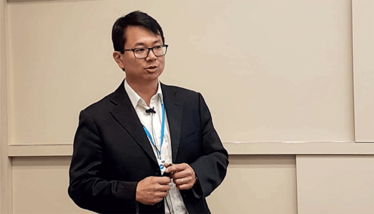Sitting Down With… The Past: Kowid Ho
We dive into the archive of 2022 for insight and inspiration – this time with Kowid Ho
| 3 min read | Interview

How can you legislate meaningful change in the pharma industry? This is a question Kowid Ho, Head of International Technical Regulatory Policy at Roche, posed in an archival interview, as he suggests that collaboration between key stakeholders is essential. Here, you can learn more about his wish list of policies, pharmaceutical frontiers, and proudest achievements.
On policy:
With regard to harmonization, there are increasing discrepancies between some regions. For example, in the EU or US regions there is a wealth of technical guidances for product development that have been published but, when we look farther afield, many countries in the world are developing their own regulation and technical guidance that introduces differences in the way products are registered. If we could develop agreements that help align these regulatory frameworks, we would see a difference in the ways companies approach product development and registration. Some industry groups are working toward this type of harmonization, but although organizations like WHO and ICH are attempting to drive convergence in that field, the broad range of topics they have to address and the limited experience mean that this won’t happen quickly. Beyond this, I would love to see greater collaboration between all the stakeholders, including regulators, academics and industries. If people shared their experiences and challenges, we could mutually learn from each other and build a better framework to enable patient access to innovative medicines.
On frontiers:
Two of the biggest areas of innovation I’ve noticed in recent years are the technological evolution that has happened in the gene therapy space and the use of big data and artificial intelligence platforms. We’re seeing the convergence of these two things more than ever before. When you develop gene therapies using AI tools, you end up with therapies that are so advanced it’s difficult to catch up. It’s also a challenge to develop appropriate regulations for this kind of fast-paced therapy development where there is a need to find a proper balance to properly enable innovation without over-regulating the field. But this is an incredibly interesting area for regulatory professionals to contend with. The future will undoubtedly have hurdles for us to address, but I’m incredibly excited by the prospect of making a difference in this area.
On achievements:
Around 2004, my team and I had a challenging time when it came to biosimilars. The European Commission wanted us to draft some guidance on their quality requirements, but we had a limited timeframe in which to do so. Despite the pressure, we managed to meet our deadline and the guidance was finally published in 2006. Many of the concepts outlined in the document are still used today on an international scale! It was a massive personal achievement and, in spite of the challenges, something I look back on with a sense of fondness.
I’ve also had the pleasure of working with the WHO. In fact, working alongside the organization has been one of the most gratifying and rewarding experiences of my professional life. The WHO’s efforts to support patients in need – wherever they might be – really bring you back to earth. The opportunity I’ve had to collaborate with them has reminded me that some of the challenges I often face within the pharmaceutical sphere are luxuries for most people around the world, who, at the end of the day, are looking for the simplest, most cost-effective methods to treat the diseases they live with.



















